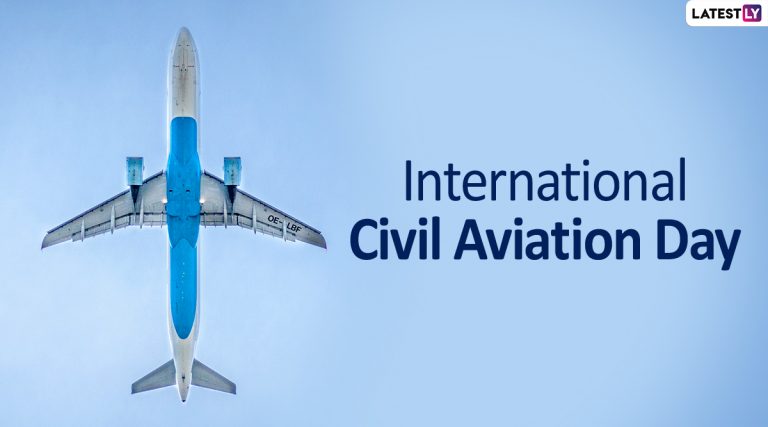Every year on December 7, people around the world celebrate International Civil Aviation Day. At first, this day might sound like it is just about airplanes, airports, and pilots—but it goes much deeper. Civil aviation is one of the greatest tools of globalization. It connects countries, helps businesses grow, supports tourism, aids in disaster relief, and even helps people chase their dreams miles away from home.
The world today would be completely different without civil aviation. Imagine a life where you could not travel quickly from India to Europe, where medicines could not be delivered overnight, or where international trade took months by sea routes. Civil aviation makes sure the world stays connected in the fastest, safest, and most efficient way possible. That is why International Civil Aviation Day isn’t just for aviation professionals—it’s a day for all of us.
The History of International Civil Aviation Day
It all started with the International Civil Aviation Organization (ICAO), a UN agency. In 1944, countries signed the Chicago Convention which created ICAO. This is the foundation of the rules, safety standards and agreements that allow planes to fly between countries.
In 1994 ICAO celebrated its 50th anniversary by introducing International Civil Aviation Day. To make sure we never forget the contribution of aviation the UN officially recognized it as an international day in 1996. Since then, December 7 is a global reminder that safe and efficient aviation keeps the world moving.
What Does “Civil Aviation” Mean?
Most people hear the word “aviation,” and have a picture of fighter jets or military aircraft in their minds. However, civil aviation is something altogether different, as civil aviation applies to all non-military types of flight and includes:
- Commercial flights (as in a commercial flight for pleasure or business)
- Cargo flight (products, medicine and goods with little or no passengers)
- Private flight (small personal aircraft and helicopters)
- Humanitarian and rescue flights (in the case of a medical emergency or needing relief due to a disaster)
In summary, every time a plane takes off for the purpose of travel, commerce, study, tourism or even fun, it is in the world of civil aviation.
Why International Civil Aviation Day Matters
Civil aviation may seem like a normal thing but the truth is it has changed human life in so many ways. Here are some of the reasons why today is so important:
- Global Connectivity: With thousands of flights daily connecting thousands of cities, families, students and professionals can be close even when they are far apart.
- Economic Growth: Tourism based economies like Thailand, Maldives and Dubai can’t survive without aviation.
- Fast Global Trade: From e-commerce deliveries to fresh flowers, fruits and medicines—air cargo moves goods across borders fast.
- Emergency Aid & Humanitarian Relief: During earthquakes or floods, aviation brings in rescue teams, medicines and food supplies faster than any other mode of transport.
- Cultural Exchange: Millions of travelers get to experience other cultures, make friends and learn from each other.
Without civil aviation the world would not be as global or as connected as it is today.
Similar to World Tourism Day, International Civil Aviation Day highlights the role of travel and connectivity in bringing people and cultures closer together.
The Theme of International Civil Aviation Day 2025
Every five years ICAO has a theme, and in the years in between, carries forward the same message. Their themes have recently expressed how aviation relates to the United Nations Sustainable Development Goals (SDGs) in a direct manner.
In 2025, sustainability, safety, and innovation remain the priority. The aviation industry is on a path to think and act more environmentally responsibly, reducing carbon footprints, switching to cleaner fuels, and developing smarter aircraft that use less energy. ICAO and the UN want International Civil Aviation Day to remind all governments and their citizens that aviation must have a future that is both green and sustainable.
How the World Celebrates This Day
Even though it is not a public holiday, many organizations/governments utilize December 7 to raise awareness and celebrate the industry’s achievements. Examples of common celebrations include:
- Seminars and Global Conferences: Communications about aircraft safety, technology, and sustainability.
- Air Shows and Exhibitions: Some countries host events showcasing aircraft, helicopters, and aviation technology.
- Student Programs: Educational institutions may offer discussions or activities relevant to aviation topic for students.
- Social Media Campaigns: Airlines, airports and aviation professionals share facts, stories and milestones using hashtags.
- Pilot and Crew Recognition: Often airlines highlight their pilots, engineers and crew for their work in making safe air travel possible.
When people engage in any of these activities, whether in an online or online space, they will learn about how much aviation supports our everyday life.
Dubai is one of the world’s busiest aviation hubs, welcoming millions of travelers every year. If you’re planning a trip, don’t miss our guide to the Top Places to Visit in Dubai.
Aviation and the Economy
One of aviation’s greatest effects is on the global economy. The International Air Transport Association (IATA) confirms that aviation supports millions of jobs around the world. Aviation supports and drives many different industries simultaneously, from airport staff to flight attendants, engineers, and tourism businesses.
- Tourism: Whole travel economies depend on affordable flights since countries like Singapore, the UAE, and Greece depend heavily on aviation tourism for income.
- Global Business: Face-to-face meetings, global expansions and global collaboration wouldn’t exist without aviation.
- Exports and Imports: Aviation represents a huge portion of the world’s high-valued trade. High-tech electronics, specialty jewelry, medicines and perishable products all require rapid air cargo.
International Civil Aviation Day is a reminder that aviation is more than just flying- it involves jobs, businesses, and global prosperity.
From beaches to historic cities, aviation makes it easier to discover the Best International Tourist Destinations around the globe.
Challenges for the Aviation Industry
Aviation has much to celebrate, but aviation also continues to confront challenges that must be resolved toward a better tomorrow:
- Environmental Impact: Aircraft generate a lot of carbon dioxide which creates climate issues.
- Fuel Prices: Aviation is price sensitive, which is affected by fuel costs, which in turn can affect ticket prices.
- Security Issues: International- terrorism as well as cyber attacks always require up-to-date forms of security.
- Infrastructure Gaps: Not all countries have modern airports or airspace systems, which creates inequalities in an international element.
International Civil Aviation Day provides an opportunity to look back at both the successes, and the challenges that require resolution.
The Future of Aviation
The next two decades may also represent a momentous shift in civil aviation. Here are some exciting opportunities being exploring around the world:
- Sustainable Aviation Fuel (SAF): Airlines are starting to use biofuels to reduce emissions.
- Electric and Hybrid Aircraft: Scientists are working on planes that are partly or fully electric.
- Supersonic Travel: Faster than sound planes will cut travel time in half.
- Smart Airports: Digitalization with AI, robotics and automation will make flying smoother and safer.
- Space Travel: Companies like SpaceX and Virgin Galactic are even looking into space tourism as the next big thing.
It’s going to get more innovative, sustainable and fun in the coming years.
How You Can Celebrate International Civil Aviation Day
Even if you’re not a pilot, aviation engineer or airline staff, you can still join in the fun. Here’s how:
- Post on social media your appreciation for aviation.
- Explore aviation careers because many students dream of being a pilot, or a person who works at an airport.
- Watch a documentary or read a history book about aviation.
- If there is an aviation seminar or online WebEx in your area, attend it.
- Plan your next trip and appreciate the gift of flying as fast and safe as possible!
With these small steps, you will help us become a global movement acknowledging the case for flight.
If you are planning to study, work, or travel abroad, make sure to check our complete guide on Immigration & Visa to stay updated with the latest requirements and tips.
Final Thoughts
International Civil Aviation Day on December 7 isn’t just about planes or airports. It’s about what aviation represents—connection, opportunity, progress, unity. Air travel has allowed us to experience different cultures, create jobs, save lives and make the world feel smaller and more connected.
As the industry moves towards a sustainable future this day is a reminder that every flight is part of a bigger mission: building bridges between people and nations. So next time you see a plane in the sky remember—it’s not just carrying passengers or cargo. It’s carrying the dream of a connected world.
FAQs
International Civil Aviation Day is celebrated every year on December 7.
The International Civil Aviation Organization (ICAO) established this day in 1994 to mark its 50th anniversary, and the United Nations officially recognized it in 1996.
We celebrate it to highlight the importance of aviation in global connectivity, economic growth, international cooperation, tourism, and humanitarian support.
The focus continues on sustainability, safety, and innovation, aligned with the UN’s Sustainable Development Goals (SDGs).
You can celebrate by sharing awareness on social media, attending aviation seminars, learning about aviation history, or simply appreciating the role of flights in our daily lives.





You must be logged in to post a comment.